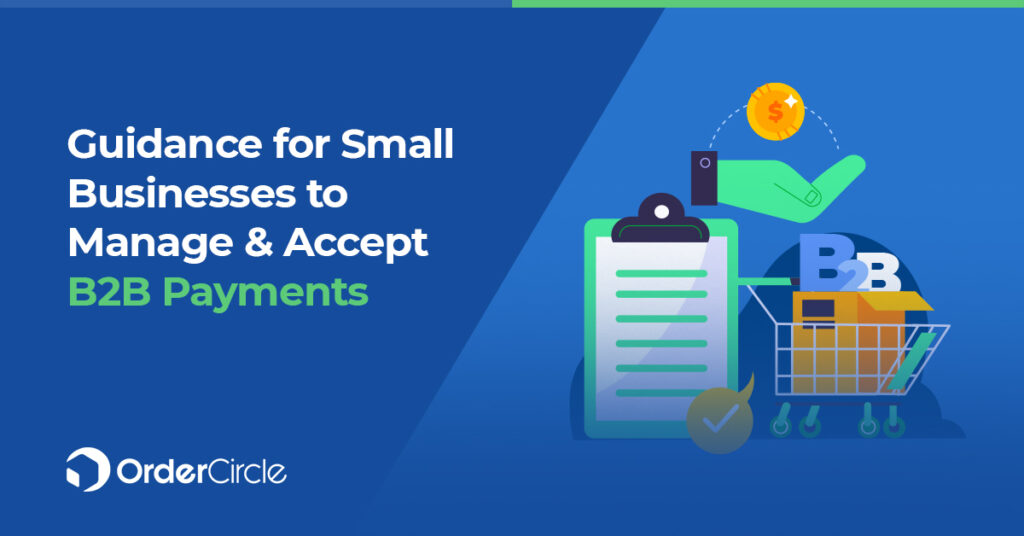Managing payments can be a tricky process for any business, but it can be particularly challenging for small businesses that engage in B2B transactions. Accepting payments from other businesses requires careful planning and management to ensure that everything runs smoothly. According to a report by FinancesOnline, 46% of small businesses report that managing their cash flow is a significant challenge.
Invoicing, payment processing, and managing orders are all critical components of B2B transactions, and small businesses need to make sure they have the right systems in place to handle these tasks. In this article, we’ll take a closer look at some essential tips and tools for small businesses to manage and accept B2B payments effectively.
Here’s a comprehensive guide to help businesses get started:
1. Use a B2B eCommerce invoicing solution
Invoicing is a critical part of managing B2B transactions. Invoicing software can help streamline the small business invoicing process, reducing the amount of time spent on manual data entry and minimizing errors. With an invoicing solution, small businesses can create and send invoices quickly and easily, automate payment reminders, and track payments. This helps ensure that invoices are paid on time, which is essential for maintaining a healthy cash flow.
With an invoicing solution like OrderCircle, you can create and send invoices to your B2B customers in just a few clicks. Plus, with features like customizable invoice templates and automatic payment reminders, you can make it easier for your customers to pay you on time.
2. Invest in a wholesale order management system
Wholesale order management systems can help small businesses manage their orders more efficiently. These systems allow businesses to automate the order processing workflow, from order entry to fulfillment, and everything in between. This can save small businesses time and money, allowing them to focus on other critical areas of their business. With a wholesale order management system like OrderCircle, small businesses can manage their orders, inventory, and customers all in one place.
3. Choose a B2B payment solution that works for your business
Small businesses need to choose a payment solution that works for their specific needs. Many payment processors charge fees for every transaction, which can add up quickly. However, there are other payment solutions available that may be more cost-effective for small businesses. For example, Automated Clearing House (ACH) payments are often much cheaper than credit card payments, making them a good option for businesses that process large volumes of transactions.
OrderCircle’s B2B payment solution integrates with leading payment gateways, including PayPal and Stripe, so you can securely accept payments online or offline. With advanced features such as automatic payment reminders and payment tracking, you can easily manage your payment processing and stay on top of your finances.
4. Embrace B2B e-commerce
B2B e-commerce is becoming increasingly popular, and for a good reason. In today’s fast-paced digital world, embracing B2B eCommerce has become a necessity for small businesses to stay competitive and grow their customer base. Here are three reasons why:
- Increased Reach: B2B eCommerce enables small businesses to reach a broader customer base, both domestically and internationally, without the need for a physical storefront.
- Enhanced Customer Experience: B2B eCommerce allows small businesses to provide an efficient and personalized customer experience by offering self-service options, real-time inventory tracking, and quick order processing.
- Cost Savings: B2B eCommerce eliminates the need for manual processes, reduces errors, and lowers operational costs, allowing small businesses to operate more efficiently and effectively.
With an e-commerce platform like OrderCircle, small businesses can create a customized storefront for their wholesale customers, automate their order processing workflow, and manage inventory all in one place.
5. Manage your inventory effectively
As a small business owner, accepting B2B payments can be a daunting task, especially when it comes to managing inventory. This is where an inventory management system comes in handy. By using such software, businesses can track their inventory levels, monitor demand and supply, and make informed purchasing decisions. Here are four reasons why every small business should have an inventory management system in place to accept B2B payments:
- Improved cash flow management: With real-time inventory tracking, businesses can optimize their purchasing and pricing strategies to maximize profits and improve cash flow.
- Reduced inventory costs: By avoiding stockouts and overstocking, businesses can minimize inventory holding costs and reduce the risk of spoilage or obsolescence.
- Better customer service: Inventory management software enables businesses to fulfill orders quickly and accurately, resulting in higher customer satisfaction and retention.
- Increased operational efficiency: By automating manual inventory management tasks, businesses can free up resources, reduce errors, and increase efficiency, ultimately leading to cost savings.
By using inventory management software like OrderCircle, you can track your inventory levels in real time, avoid stockouts, and make informed decisions about your purchasing and pricing strategies. This can help you optimize your cash flow and improve your bottom line.
In conclusion, managing B2B payments is a complex process, but small businesses can make it easier by using the right tools and strategies. By investing in invoicing software, and wholesale order management systems, and choosing the right payment solutions, small businesses can streamline their operations, reduce costs, and improve their cash flow. Additionally, prioritizing security and embracing B2B e-commerce can help small businesses grow their customer base and stay competitive.
To learn more about how OrderCircle can help small businesses manage their B2B transactions, visit our website and check out our features for invoicing, payment, order, and inventory management. You can also book a free demo today for better guidance!

